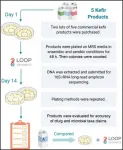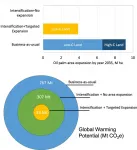Telemedicine needs to be integrated into cardiology training, experts recommend
While patients are embracing telemedicine, significant numbers of cardiology trainees are uncomfortable with telemedicine according to survey results reported in the Canadian Journal of Cardiology
2021-05-12
(Press-News.org) Philadelphia, May 12, 2021 - The COVID-19 pandemic has resulted in an abrupt change in healthcare delivery, including a shift from in-person visits to telemedicine. However, a Canadian survey found that a significant proportion of cardiology trainees are uncomfortable with using telemedicine and feel that better preparation for new-tech medicine is needed. Experts draw attention to the need for a telemedicine curriculum that includes supervision to prepare trainees for the expanding role of telemedicine in cardiovascular care. Survey results are published in the Canadian Journal of Cardiology.
"Our outpatient care shifted almost overnight from in-person visits to providing care to patients via telephone or video platforms (known as telemedicine) as a result of COVID-19," explained principal investigator Parvathy Nair, MD, FRCPC, Division of Cardiology, Department of Medicine, Vancouver General Hospital, University of British Columbia, Vancouver, BC, Canada. "It was clear that training had to adapt to this change."
Virtual visits are fundamentally different from face-to-face encounters. They require providers to employ key communication skills such as effective web-side manners, agenda setting, reflective listening, virtual physical examination skills, and understanding the medicolegal boundaries of virtual healthcare. Of equal importance is recognizing situations in which virtual visits should not replace face-to-face encounters, for example in acutely ill patients requiring full physical examination.
In December 2020, the investigators distributed a self-administered survey of 22 questions in four categories (background, exposure to telemedicine before COVID-19, current telemedicine experience, and perceived barriers to telemedicine). A total of 86 cardiology trainees from 12 programs in Canada completed the survey, a response rate of 65 percent.
Before COVID-19, 39 trainees (45 percent) reported having been exposed to telemedicine. This increased to 67 trainees (78 percent) after COVID-19. Junior trainees had less exposure to telemedicine compared with senior trainees: 16 out of 25 (64 percent) versus 51 out of 61 (84 percent), respectively. When engaged in telemedicine, only four of the 67 trainees reported full supervision with an attending physician overseeing the entire virtual visit, while 13 reported partial supervision and 50 had minimal or no supervision.
"We found that only 51 percent of the trainees were comfortable or very comfortable with providing outpatient care via telemedicine," noted Dr. Nair. "We attributed this to the lack of dedicated telemedicine training. Additionally, our finding that three-quarters of trainees had minimal or no supervision when carrying out virtual visits suggested that lack of staff oversight may contribute to this lack of trainee comfort. Trainees with higher telemedicine exposure were more likely to feel comfortable with its practice and intend to adopt it in their future careers."
The reasons given by trainees as barriers to telemedicine practice included fear of weakening the patient-physician relationship; concerns about ease of use by patients; and unfamiliarity with telemedicine technology. Not surprisingly, the majority of trainees (78 percent) believed training in telemedicine was needed. In particular, trainees expressed the need to learn more about the medicolegal aspects of telemedicine, how to conduct virtual clinical assessment, and how to document their patients' visits.
A recent survey published by the Canadian Medical Association reported that four of every 10 Canadians would prefer to have their medical care provided via telemedicine even after the COVID-19 pandemic is resolved. As telemedicine technology continues to evolve and provincial authorities increase their support, more and more Canadians are expected to prefer virtual options for their healthcare needs.
According to Dr. Nair, "The findings that only one in two trainees is comfortable with telemedicine and one in four do not plan to provide telemedicine services in the future are therefore concerning." To address this educational gap, Dr. Nair and Dr. Aws Almufleh, the lead investigators, are now developing a telemedicine curriculum to better prepare cardiology trainees to take part in providing evidence-based, high quality virtual outpatient care.
"The pandemic has magnified the need for accessible virtual outpatient care in medicine. As educators, it is incumbent upon us to train the future generation of cardiology specialists to provide the highest quality virtual care services for all patients who need them. We are optimistic that by collaborating with educators from around the country, we can accomplish this goal," commented Dr. Nair.
INFORMATION:
ELSE PRESS RELEASES FROM THIS DATE:
2021-05-12
Philadelphia, May 12, 2021 - In recent years there has been an increased interest in the consumption of kefir, a fermented dairy beverage, because there is some evidence that it has health benefits and its affordability. A new study by researchers from the University of Illinois and The Ohio State University, published in JDS Communications, found that 66 percent of the commercial kefir products studied overstated microorganism density and 80 percent contained bacterial species that were not included on the label, potentially misleading consumers.
Senior author Kelly S. Swanson, PhD, University of Illinois, Urbana, ...
2021-05-12
A new study led by the Centre for Nutraceuticals in the University of Westminster shows that pink drinks can help to make you run faster and further compared to clear drinks.
The researchers found that a pink drink can increase exercise performance by 4.4 per cent and can also increase a 'feel good' effect which can make exercise seem easier.
The study, published in the journal Frontiers in Nutrition, is the first investigation to assess the effect of drink colour on exercise performance and provides the potential to open a new avenue of future research in the field of sports drinks and exercise.
During the study participants were asked to run on a treadmill for 30 minutes at a self-selected speed ensuring their rate of exertion remained consistent. Throughout the exercise ...
2021-05-12
For college students under pressure, a dog may be the best stress fighter around.
Programs exclusively focused on petting therapy dogs improved stressed-out students' thinking and planning skills more effectively than programs that included traditional stress-management information, according to new Washington State University research.
The study was published today in the journal AERA Open, a peer-reviewed journal of the American Educational Research Association. The paper demonstrated that stressed students still exhibited these cognitive skills improvements up to six weeks after completion of the four-week-long program.
"It's a really powerful finding," said Patricia Pendry, associate professor in WSU's Department of ...
2021-05-12
Researchers from University of Maryland, North Carolina State University, National Taiwan University, Oxford University, Kings College London, and Perceptronics Solutions, Inc. published a new paper in the Journal of Marketing that examines how artificial intelligence (AI)-based text analysis of social media can monitor the extent to which brand reputation rises and falls over time.
The study, forthcoming in the Journal of Marketing, is titled "Real-Time Brand Reputation Tracking using Social Media" and is authored by Roland Rust, William Rand, Ming-Hui Huang, Andrew Stephen, Gillian Brooks, ...
2021-05-12
INDIANAPOLIS -- Artificial intelligence (AI)-driven healthcare has the potential to transform medical decision-making and treatment, but these algorithms must be thoroughly tested and continuously monitored to avoid unintended consequences to patients.
In a JAMA Network Open Invited Commentary, Regenstrief Institute President and Chief Executive Officer and Indiana University School of Medicine Associate Dean for Informatics and Health Services Research Peter Embí, M.D., M.S., strongly stated the importance of algorithmovigilance to address inherent biases in healthcare algorithms and their deployment. ...
2021-05-12
A global team of researchers recently released the results of a 'data-rich' modeling approach designed to illustrate a range of what-if scenarios for future oil palm plantation development in Indonesia. The study provides new insight into crop production strategies available to an industry facing increasing scrutiny.
Oil palm production is challenged by global and domestic concerns related to how it operates within its tropical rainforest environment, which is highly valued for its contribution to climate change mitigation potential and biodiversity protection. The study sheds new light on the future implications of maintaining business-as-usual ...
2021-05-12
ROCHESTER, Minn. -- Patients diagnosed with post-COVID-19 syndrome, also known as "PCS," "COVID-19 long-haul syndrome" and "Post-Acute Sequelae of SARS COV-2," experience symptoms such as mood disorders, fatigue and perceived cognitive impairment that can negatively affect returning to work and resuming normal activities, according to a Mayo Clinic study published in Mayo Clinic Proceedings.
The study reports on the first 100 patients to participate in Mayo Clinic's COVID-19 Activity Rehabilitation program (CARP), one of the first multidisciplinary programs established to evaluate ...
2021-05-12
A 'slow-motion' earthquake lasting 32 years - the slowest ever recorded - eventually led to the catastrophic 1861 Sumatra earthquake, researchers at the Nanyang Technological University, Singapore (NTU Singapore) have found.
The NTU research team says their study highlights potential missing factors or mismodelling in global earthquake risk assessments today.
'Slow motion' earthquakes or 'slow slip events' refer to a type of long, drawn-out stress release phenomenon in which the Earth's tectonic plates slide against one another without causing major ground shaking or destruction. They typically involve movements of between ...
2021-05-12
New research at Karolinska Institutet in Sweden suggests a link between psychosis and a genetic change that affects the brain's immune system. The study published in Molecular Psychiatry may impact the development of modern medicines for bipolar disorder or schizophrenia.
Psychosis affects approximately 2-3 per cent of the population and is characterized by a change in the perception of reality, often with elements of hallucinations and paranoid reactions.
Most of the people affected are patients with schizophrenia, but people with bipolar disorder may also experience psychotic symptoms.
The antipsychotics available today often have insufficient efficacy, and for patients, ...
2021-05-12
Anyone who's raised a child or a pet will know just how fast and how steady their growth seems to be. You leave for a few days on a work trip and when you come home the child seems to have grown 10cm! That's all well and good for the modern household, but how did dinosaurs grow up? Did they, too, surprise their parents with their non-stop growth?
A new study lead by Dr Kimberley Chapelle of the American Museum of Natural History in New York City and Honorary Research Fellow at the University of the Witwatersrand suggests NOT. At least for one iconic southern African dinosaur species. By looking at the fossil ...
LAST 30 PRESS RELEASES:
[Press-News.org] Telemedicine needs to be integrated into cardiology training, experts recommend
While patients are embracing telemedicine, significant numbers of cardiology trainees are uncomfortable with telemedicine according to survey results reported in the Canadian Journal of Cardiology






